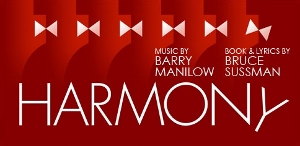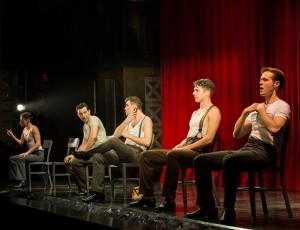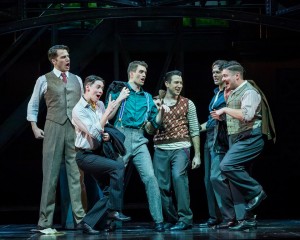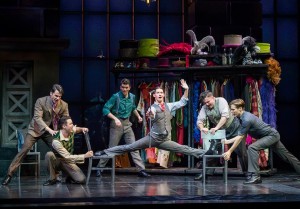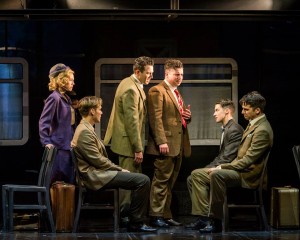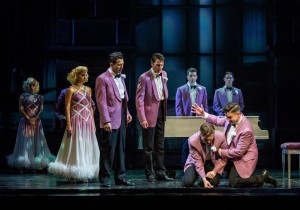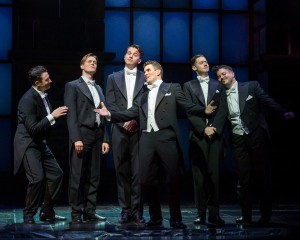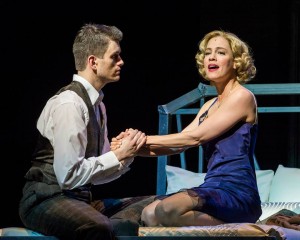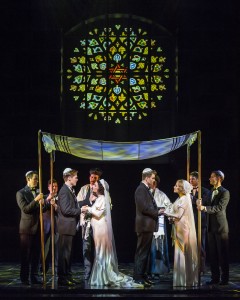IT’S SAFE TO PUT YOURSELF IN HARMONY‘S WAY
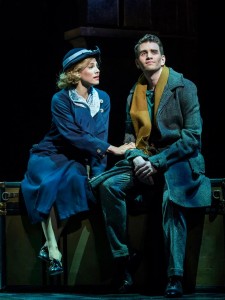 Barry Manilow and Bruce Sussman’s high-energy, surprisingly melancholy new musical, Harmony, depicts the real-life story of the all-male singing ensemble, the Comedian Harmonists. Through buttery, close harmonies, an excellent cast, and fluid staging, this unusually dichotomous musical follows the Interwar boy band through their formation in the late 1920s to the peak of their international stardom, and then their sharp demise resulting from the fascist censorship of the Nazi regime.
Barry Manilow and Bruce Sussman’s high-energy, surprisingly melancholy new musical, Harmony, depicts the real-life story of the all-male singing ensemble, the Comedian Harmonists. Through buttery, close harmonies, an excellent cast, and fluid staging, this unusually dichotomous musical follows the Interwar boy band through their formation in the late 1920s to the peak of their international stardom, and then their sharp demise resulting from the fascist censorship of the Nazi regime.
Hailing from Germany, the Comedian Harmonists rose to fame toward the end of the Weimar era as the burgeoning Nazi Party loomed over Deutschland. Their pleasant harmonics, good-looks, and charismatic, cheeky performance style was surely a welcome antidote for the distraction-seeking audiences who were in the midst of wide-spread economic depression.
The group of six was comprised of pianist Erwin “Chopin” Bootz, bass singer Bobby Biberti, baritone Roman “Rabbi” Cykowski, tenors Erich Collin and Ari “Lesh” Leshnikoff, and tenor buffo Harry Frommerman. Their voices blended to create soft and light vocal textures, which they often enhanced with comedic voice effects.
Despite their mass appeal and the general public’s love of their music, the Nazi Ministry of Public Enlightenment and Propaganda deemed the Comedian Harmonists degenerate because three members were Jewish, and another was married to a Jewish woman. Most of their films and recordings were destroyed during the Shoah, but some remain:
The highly popular group dispersed just before the outbreak of World War II, as each was pulled in his own direction for the sake of survival and self-preservation.
The Comedian Harmonists never reunited or saw each other again. Harmony captures their journey in two contrasting acts. The first is in an old-school styled, lushly produced Rogers and Hart-esque American musical full of hope, love, friendship, humor, catchy music, and a touch of slapstick (although devastation is foreshadowed throughout). The storyline is dominated by dark plot turns in Act II. Bravery and solidarity in the face of adversity is pitted against loss and fear. Harmony tackles tough socio-political issues of the day’”economic disenfranchisement, senseless anti-Semitism, cultural censorship, mass complacency’”through an undeniably sad narrative. The production ends on a somber, bittersweet note that stands in stark contrast to its earlier homage to the optimism-laden musical theatre themes of the 1930s.
Playing the Comedian Harmonists are Shayne Kennon (Cykowski), Matt Bailey (Frommerman), Will Blum (“Lesh”), Chris Dwan (Collin), Will Taylor (“Chopin”), and Douglas Williams (Biberti); they blanket their audience in tonal warmth and texture while delivering blazingly energized performances. Each triple-threat member sings beautifully and acts brightly, while fostering a tight-knit chemistry that reinforces the bonds shared by the men they portray.
Kennon plays central character “Rabbi” with endearing warmth and boundless effervescence. His role grazes cliché cheery, old-Jewish guy stereotypes (not helped by an unfortunate reference to snacking on knishes), but even with an out-of-place Brooklyn accent, Kennon overcomes this with a deeply focused sincerity and gleaming stage presence. As “Lesh,” Blum’s on-point comedic timing and sweet, earnest charm make him an easy audience favorite. As Biberti, trained opera-singer Williams is an absolute pleasure to watch in the musical theatre context–his powerful, deep-bellied bass adds rich consonance. Playing love interests Ruth and Mary, Hannah Corneau and Leigh Ann Larkin are passionate and powerful vocalists.
Tony Speciale’s magnetic direction is grand without being imposing. Scene changes are beautifully and smoothly executed, ensuring that the audience is always coasting on a musical theater high. Vintage aesthetics influence Speciale’s blocking, JoAnn M. Hunter’s broad, classic, and flirtatious choreography, and Tobin Ost’s tasteful, constantly morphing set. Harmony treats its audience to several gorgeously executed dramatic moments cloaked in 1930s’ Hollywood-style spectacle numbers.
For the most part, Sussman’s lyrics and uniquely structured book’”crafted like a memory play’”are entertaining and emotionally moving. There is some blaringly wrong anachronistic dialogue, and a parody number, “Come to the Fatherland,” is grossly executed as a device, but his decision to go with a bell-shaped plot that starts and ends on an introspective note is smartly refreshing. He avoids false enthusiasm that most traditional musicals try to pass off as art, and instead focuses on the beauty to be found in honesty and realism, which rarely co-exists with Musical Theater.
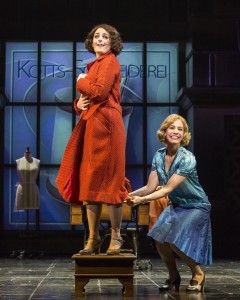 Manilow’s lovingly crafted score, a major draw, is a well-balanced mix of modern and period elements marked by his signature style. Some numbers are fun and catchy, some are beautiful plays on traditional Hebrew music, and others are compelling torch songs. The only regret is that the orchestra prominently features a synthetic sounding keyboard, and lacks authentic orchestrations.
Manilow’s lovingly crafted score, a major draw, is a well-balanced mix of modern and period elements marked by his signature style. Some numbers are fun and catchy, some are beautiful plays on traditional Hebrew music, and others are compelling torch songs. The only regret is that the orchestra prominently features a synthetic sounding keyboard, and lacks authentic orchestrations.
Harmony has been worked on for years, and may have its detractors. This reviewer thinks they are all crazy. It is so very easy to fall in love with this musical.
Harmony
Center Theatre Group
Ahmanson Theatre
scheduled to end on April 13, 2014
for tickets, call (213) 972-4400
or visit www.CenterTheatreGroup.org
